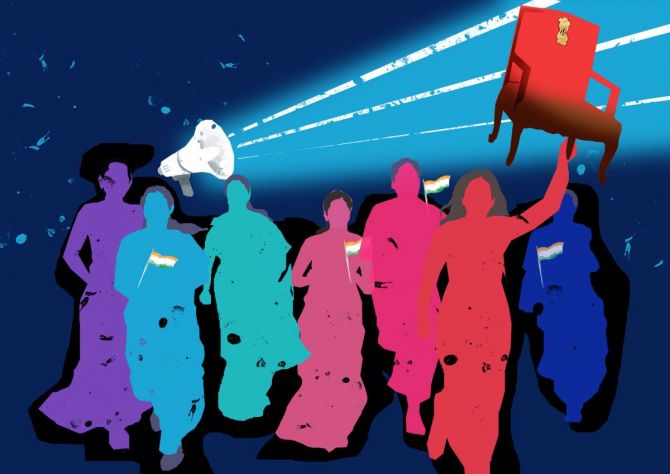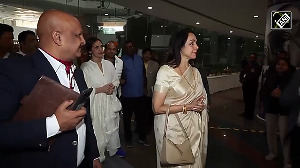Ahead of the upcoming elections, political parties have started announcing incentives to benefit women, but what do women truly seek for genuine gender parity, asks Nivedita Mookerji.

The theme of International Women's Day 2024 -- Invest in Women, Accelerate Progress -- is a reminder that the world needs to change to achieve anything close to gender equality.
There's no better time than an election for a reality check.
In the year of elections (with about 50 of them spread across 2024), when political leaders make their pitch and voters decide, how are women positioned and how central are the issues related to them?
Sheikh Hasina recently won a fourth successive term as prime minister of Bangladesh. While she may be the world's longest-serving woman leader, only 5 per cent of the 1,895 candidates fighting for 300 parliamentary seats in the country were women, highlighting a stark gender divide.
This stands in contrast to the progress that women have made in education and socio-economic indicators.
During the February elections in Pakistan, according to media reports, more women than ever before contested in the National Assembly and provincial assemblies.
Women cut across urban and rural areas campaigned tirelessly, articulating their vision for a better Pakistan, as reported by Forbes.
Mexico, which is headed for an election in June, may have its first woman president.
In a recent piece Al Jazeera columnist Belen Fernandez hailed the prospect of a woman leader as a positive milestone, but questioned whether it would help resolve the existential challenges faced by women in Mexico.
The writer cited a 137 per cent rise in femicides in Mexico between 2015 and 2020, adding that, on average, 10 women and girls are killed every day in the country, and a large number of femicides go unprosecuted.
When Lai Ching-te was elected Taiwan's president recently, his running mate, Hsiao Bi-khim, became the second woman to hold the office of vice-president in the country.
Despite this achievement, gender issues were hardly a part of the election campaign discourse, even as significant gender disparities persist in salary and social milieu.
In poll-bound UK, women voters are a talking point. Recently, Professor Rosie Campbell, director of the Global Institute for Women's Leadership, emphasised that women voters will be critical to the outcome of the next election.
At a time when concerns about household finances and public services, such as the National Health Service (NHS), loom large, political parties are watching out for what women want.
In the US, surveys using Pew Research Center's American Trends Panel throw light on why there are fewer women than men in high political offices.
For instance, some 54 per cent of those surveyed believe women have to do more to prove themselves than men, 47 per cent see gender discrimination as a reason, another 47 per cent think women get less support from party leaders, and 44 per cent pin it down to family responsibilities of women.
Back home, competing with one another ahead, political parties have begun announcing sops to benefit women.
Notably, the ruling party at the Centre, the Bharatiya Janata Party, has rolled out advertisements highlighting its flagship schemes that “empower” women.
These ads showcase the public's gratitude towards Prime Minister Narendra Modi for transforming the lives of women, through tap water, toilets and subsidised LPG connections -- the three key welfare instruments.
The dashboards of Jal Jeevan Mission, Swachh Bharat and Pradhan Mantri Ujjwala Yojana (PMUY) present a case for each of these flagship schemes that promise to benefit the poor, mainly in rural India.
The pre-poll ads link these schemes with women empowerment.
Under Jal Jeevan Mission (JJM), the central government, in partnership with states, aims to connect every rural household with tap water supply by 2024.
Har Ghar Jal, another nomenclature for the scheme, is seen as more popular among women.
An estimated 74 per cent of the rural households are connected to tap water now, up from 17 per cent in 2019 when JJM was launched.
In the case of the Swachh Bharat Mission, launched in 2014 as the world's largest sanitation initiative, it led to the construction of 100 million household toilets, according to government figures.
The initiative claims to have increased the sanitation coverage from 39 per cent in 2014 to 100 per cent in 2019, in the process empowering women, apart from the economic, environment and health benefits of the move.
Critics, however, have pointed out execution gaps in the scheme, such as a lack of piped water supply and substandard construction of toilet substructures, making it appear less appealing than projected.
The third scheme, PMUY or Ujjwala, which is aimed at providing subsidised LPG connections to women from below poverty line households, has become a symbol for clean cooking fuel.
The total LPG connections released under the scheme as of February 29 surpassed 100 million.
In India, the newly enrolled female electors, at around 14 million, will surpass their male counterparts, who number around 12 million during the 2024 elections. But the total number of male voters, at 497 million, remains more than a notch higher than the 471 million women voters.
Beyond these numbers, the sops and the schemes, what is it that women want changed? This is their chance to speak up.
Disclaimer: These are Nivedita Mookerji's personal views.
Feature Presentation: Rajesh Alva/Rediff.com











